| B i o g r a p h y |
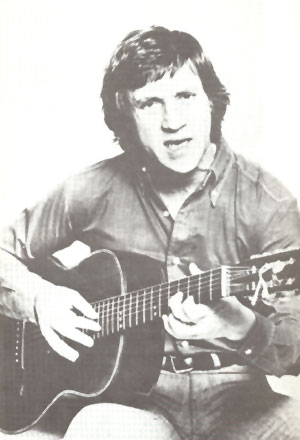 Vladimir Semyonovich Vysotsky (Russian: Владимир Семёнович Высоцкий,
Vladimir Semënovič Vysockij) (January 25, 1938 – July 25, 1980) was an
iconic Russian singer, songwriter, poet, and actor whose career had an
immense and enduring effect on Russian culture. The multifaceted talent
of Vladimir Vysotsky is often described by the word bard, which
acquired a special meaning in the Soviet Union. Vysotsky was never
enthusiastic about this term, however. He thought of himself mainly as
an actor and writer, and once remarked, "I do not belong to what people
call bards or minstrels or whatever." Though his work was largely
ignored by the official Soviet cultural establishment, he achieved
remarkable fame during his lifetime, and to this day exerts significant
influence on many of Russia's popular musicians and actors who wish to
emulate his iconic status.
Vladimir Semyonovich Vysotsky (Russian: Владимир Семёнович Высоцкий,
Vladimir Semënovič Vysockij) (January 25, 1938 – July 25, 1980) was an
iconic Russian singer, songwriter, poet, and actor whose career had an
immense and enduring effect on Russian culture. The multifaceted talent
of Vladimir Vysotsky is often described by the word bard, which
acquired a special meaning in the Soviet Union. Vysotsky was never
enthusiastic about this term, however. He thought of himself mainly as
an actor and writer, and once remarked, "I do not belong to what people
call bards or minstrels or whatever." Though his work was largely
ignored by the official Soviet cultural establishment, he achieved
remarkable fame during his lifetime, and to this day exerts significant
influence on many of Russia's popular musicians and actors who wish to
emulate his iconic status.
Vladimir Vysotsky was born in Moscow. His father was an army officer and his mother a German language translator. His parents divorced shortly after his birth, and he was brought up by his stepmother of Armenian descent, whom he called "aunt" Yevgenia. He spent two years of his childhood living with his father and stepmother at a military base in Eberswalde in the Soviet-occupied section of post-WWII Germany (later GDR). In 1955, Vladimir enrolled in the Moscow Institute of Civil Engineering, but dropped out after just one semester to pursue an acting career. In 1959, he started acting at the Aleksandr Pushkin Theatre where he had mostly small parts. Vysotsky's first wife was Iza Zhukova. He met his second wife, Ludmilla Abramova, in 1961. They were married in 1965 and had two sons, Arkady and Nikita. In 1964, director Yuri Lyubimov, who was to become Vysotsky's close friend and mentor, invited him to join the popular Moscow Theatre of Drama and Comedy on the Taganka. There, Vysotsky made headlines with his leading roles in Shakespeare's Hamlet and Brecht's Life of Galileo. Around the same time, he also appeared in several films, which featured a few of his songs, e.g., Vertikal ("The Vertical"), a film about mountain climbing. Most of Vysotsky's work from that period, however, did not get official recognition and thus no contracts from Melodiya, the monopolist of the Soviet recording industry. Nevertheless, his popularity continued to grow, as, with the advent of portable tape-recorders in the USSR, his music became available to the masses in the form of home-made reel-to-reel audio tape recordings, and later on cassette tapes. He became known for his unique singing style and for his lyrics, which featured social and political commentary in often humorous street jargon. His lyrics resonated with millions of Soviet people in every corner of the country; his songs were sung at house parties and amateur concerts.
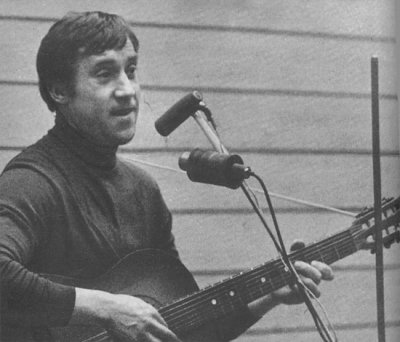 After
his divorce, Vysotsky fell in love with Marina Vlady, a French actress
of Russian descent, who was working at Mosfilm on a joint Soviet-French
production at that time. Marina had been married before and had 3
children, while Vladimir had two. Fueled by Marina's exotic status as a
Frenchwoman in the USSR, and Vladimir's unmatched popularity in his
country, their love was passionate and impulsive. They were married in
1969. For 10 years the two maintained a long-distance relationship as
Marina compromised her career in France in order to spend more time in
Moscow, and Vladimir's friends pulled strings in order for him to be
allowed to travel abroad to stay with his wife. Marina eventually
joined the Communist Party of France, which essentially gave her an
unlimited-entry visa into the USSR, and provided Vladimir with some
immunity against prosecution by the government, which was becoming
weary of his covertly anti-Soviet lyrics and his odds-defying
popularity with the masses. The problems of his long-distance
relationship with Vlady inspired several of Vysotsky's songs. By the
mid-1970s, Vysotsky had been suffering from alcoholism for quite some
time. Many of his songs from the period deal – either directly or
metaphorically – with alcoholism, insanity, mania, and obsessions. This
was also the height of his popularity, when, as described in Vlady's
book about her husband, walking down the street on a summer night, one
could hear Vystotsky's recognizable voice coming literally from every
open window. Unable to completely ignore his musical phenomenon,
Melodiya did release a few of his songs on vinyl in the late 1970s,
which, however, constituted only a small portion of his creative work,
which millions already owned on tape and knew by heart.
After
his divorce, Vysotsky fell in love with Marina Vlady, a French actress
of Russian descent, who was working at Mosfilm on a joint Soviet-French
production at that time. Marina had been married before and had 3
children, while Vladimir had two. Fueled by Marina's exotic status as a
Frenchwoman in the USSR, and Vladimir's unmatched popularity in his
country, their love was passionate and impulsive. They were married in
1969. For 10 years the two maintained a long-distance relationship as
Marina compromised her career in France in order to spend more time in
Moscow, and Vladimir's friends pulled strings in order for him to be
allowed to travel abroad to stay with his wife. Marina eventually
joined the Communist Party of France, which essentially gave her an
unlimited-entry visa into the USSR, and provided Vladimir with some
immunity against prosecution by the government, which was becoming
weary of his covertly anti-Soviet lyrics and his odds-defying
popularity with the masses. The problems of his long-distance
relationship with Vlady inspired several of Vysotsky's songs. By the
mid-1970s, Vysotsky had been suffering from alcoholism for quite some
time. Many of his songs from the period deal – either directly or
metaphorically – with alcoholism, insanity, mania, and obsessions. This
was also the height of his popularity, when, as described in Vlady's
book about her husband, walking down the street on a summer night, one
could hear Vystotsky's recognizable voice coming literally from every
open window. Unable to completely ignore his musical phenomenon,
Melodiya did release a few of his songs on vinyl in the late 1970s,
which, however, constituted only a small portion of his creative work,
which millions already owned on tape and knew by heart.
At the same time, Vysotsky gained official recognition as a theater and film actor. He starred in a hugely popular TV series Mesto Vstrechi Izmenit' Nel'zya ("The Meeting Place Cannot Be Changed") about two cops fighting crime in late 1940s Stalinist Russia. In spite of his successful acting career, Vysotsky continued to make a living with his concert tours across the country, often on a compulsive binge-like schedule, which, it is believed, contributed to the deterioration of his health. He died in Moscow at the age of 42 of heart failure. Vysotsky's body was laid out at the Taganka Theatre, where the funeral service was held. He was later buried at the Vagankovskoye Cemetery in Moscow. Thousands of Moscow citizens left the stadiums (as it was the time of the Olympics) to attend the funeral. Although no official figure was released, it was later estimated that over one million people attended Vysotsky's funeral [1], almost as many as that of Pope John Paul II in 2005. The Soviet authorities, taken aback by the unexpected impact on the masses of the death of an underground singer, ordered troops into Moscow to prevent possible riots. Vysotsky was posthumously awarded the title Meritorious Artist of Soviet Union.
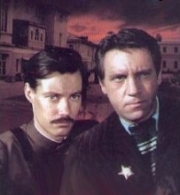 In
years
to come, Vysotsky's flower-adorned grave became a site of
pilgrimage for several generations of his fans, the youngest of whom
were born after his death. His tombstone also became the subject of
controversy, as his widow had wished for a simple abstract slab, while
his parents insisted on a realistic gilded statue. Although probably
too serious to have inspired Vysotsky himself, the statue is believed
by some to be full of metaphors and symbols reminiscent of the singer's
life. One of the more obvious symbols is the angel-like wings that wrap
the statue's body. The angel wings are supposed to symbolize Vysotsky's
importance to all oppressed peoples; they are wrapped around his body
to represent the fact that he was never allowed to fully spread his
talent and flourish during his lifetime due to the oppressive regime.
Another symbol is the two horse heads, which might refer to his
landmark song "Koni Priveredliviye". Shortly after Vysotsky's death,
many Russian bards wrote songs and poems about his life and death. The
best known are Yuri Vizbor's "Letter to Vysotsky" (1982) and Bulat
Okudzhava's "About Volodya Vysotsky" (1980). Every year on Vysotsky's
birthday, festivals are held throughout Russia and in many communities
throughout the world, especially in Europe. Vysotsky's impact in Russia
is often compared to that of Bob Dylan in America, or Brassens and Brel
in France. Years after her husband's death, urged by her friend Simone
Signoret, Marina Vlady wrote a book about her years together with
Vysotsky. The book pays tribute to Vladimir's talent and rich persona,
yet is uncompromising in its depiction of his addictions and the
problems that they caused in their marriage. The book was written in
French and translated into Russian in tandem by Vlady and a
professional translator. It is widely read in Russia by fans seeking to
understand the man who gave them so many beloved songs.The asteroid 2374
Vladvysotskij, discovered by Lyudmila Zhuravleva, is named after
Vysotsky.
In
years
to come, Vysotsky's flower-adorned grave became a site of
pilgrimage for several generations of his fans, the youngest of whom
were born after his death. His tombstone also became the subject of
controversy, as his widow had wished for a simple abstract slab, while
his parents insisted on a realistic gilded statue. Although probably
too serious to have inspired Vysotsky himself, the statue is believed
by some to be full of metaphors and symbols reminiscent of the singer's
life. One of the more obvious symbols is the angel-like wings that wrap
the statue's body. The angel wings are supposed to symbolize Vysotsky's
importance to all oppressed peoples; they are wrapped around his body
to represent the fact that he was never allowed to fully spread his
talent and flourish during his lifetime due to the oppressive regime.
Another symbol is the two horse heads, which might refer to his
landmark song "Koni Priveredliviye". Shortly after Vysotsky's death,
many Russian bards wrote songs and poems about his life and death. The
best known are Yuri Vizbor's "Letter to Vysotsky" (1982) and Bulat
Okudzhava's "About Volodya Vysotsky" (1980). Every year on Vysotsky's
birthday, festivals are held throughout Russia and in many communities
throughout the world, especially in Europe. Vysotsky's impact in Russia
is often compared to that of Bob Dylan in America, or Brassens and Brel
in France. Years after her husband's death, urged by her friend Simone
Signoret, Marina Vlady wrote a book about her years together with
Vysotsky. The book pays tribute to Vladimir's talent and rich persona,
yet is uncompromising in its depiction of his addictions and the
problems that they caused in their marriage. The book was written in
French and translated into Russian in tandem by Vlady and a
professional translator. It is widely read in Russia by fans seeking to
understand the man who gave them so many beloved songs.The asteroid 2374
Vladvysotskij, discovered by Lyudmila Zhuravleva, is named after
Vysotsky.
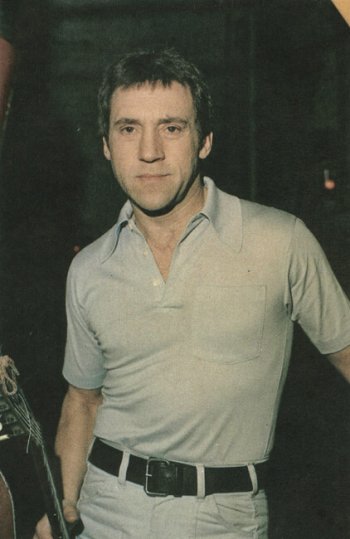 The
poet accompanied himself on a Russian seven-string guitar, with an
intense voice singing ballads of love, peace, war, everyday Soviet life
and of the human condition. He had the ring of honesty and truth, with
an ironic and sometimes sarcastic touch that jabbed at the Soviet
government, which made him a target for surveillance and threats. In
France, he has been compared with French singer Georges Brassens. In
Russia, however, he was more frequently compared with Joe Dassin, in
part because they were the same age and died in the same year; however,
their ideologies, biographies, and musical styles are very different.
Vysotsky's lyrics and style greatly influenced Jacek Kaczmarski, a
Polish songwriter and singer who touched on similar themes. The
songs—over 600 of them—were written about almost any imaginable theme.
The earliest were outlaw songs. These songs were based either on the
life of the common people in Moscow (criminal life, prostitution, and
extreme drinking) or on life in the Gulags. Vysotsky slowly grew out of
this phase and started singing more serious, though often satirical,
songs. Many of these songs were about war. These war songs were not
written to glorify war, but rather to expose the listener to the
emotions of those in extreme, life threatening situations. Most Soviet
veterans would say that Vysotsky's war songs described the truth of war
far more accurately than more official "patriotic" songs. Nearly all of
Vysotsky's songs are in the first person, although he is almost never
the narrator. When singing his criminal songs, he would adopt the
accent and intonation of a Moscow thief, and when singing war songs, he
would sing from the point of view of a soldier. In many of his
philosophical songs, he adopted the role of inanimate objects. This
created some confusion about Vysotsky's background, especially during
the early years when information could not be passed around very
easily. Using his acting talent, the poet performed his role play so
well that until told otherwise, many of his fans believed that he was,
indeed, a criminal or war veteran. Vysotsky's father said that "War
participants thought the author of the songs to be one of them, as if
he had participated in the war together with them." The same could be
said about mountain climbers; on multiple occasions, Vysotsky was sent
pictures of mountain climbers' graves with quotes from his lyrics
etched on the tombstones. Many film soundtracks, especially those
featuring the singer, incorporated Vysotsky's songs. One of the most
notable examples is Vertikal, a movie about mountain climbers. Not
being officially recognized as a poet and singer, Vysotsky performed
wherever and whenever he could - in the theater (where he worked), at
universities, in private apartments, village clubs, and in the open
air. It was not unusual for him to give several concerts in one day. He
used to sleep little, using the night hours to write. In his final
years, he managed to perform outside the USSR and held concerts in
Paris, Toronto, and New York City. Despite Vysotsky's
anti-establishment bend, The Soviet leader Brezhnev (who was alleged to
be a fan of Vysotsky, himself) allowed Vysotsky to perform live on
Soviet television. This was the first time something or someone so
cynical towards the regime was allowed on Soviet TV. One of the songs
he played was "I do not like," which he would later perform on American
television in an interview with 60 Minutes. With few exceptions, he
wasn't allowed to publish his recordings with "Melodiya", which held a
monopoly on the Soviet music industry. His songs were passed on through
amateur, fairly low quality recordings on vinyl discs and magnetic
tape, resulting in his immense popularity. Cosmonauts even took his
music on cassette into orbit. — His writings were all published
posthumously except for one poem printed in 1975.
The
poet accompanied himself on a Russian seven-string guitar, with an
intense voice singing ballads of love, peace, war, everyday Soviet life
and of the human condition. He had the ring of honesty and truth, with
an ironic and sometimes sarcastic touch that jabbed at the Soviet
government, which made him a target for surveillance and threats. In
France, he has been compared with French singer Georges Brassens. In
Russia, however, he was more frequently compared with Joe Dassin, in
part because they were the same age and died in the same year; however,
their ideologies, biographies, and musical styles are very different.
Vysotsky's lyrics and style greatly influenced Jacek Kaczmarski, a
Polish songwriter and singer who touched on similar themes. The
songs—over 600 of them—were written about almost any imaginable theme.
The earliest were outlaw songs. These songs were based either on the
life of the common people in Moscow (criminal life, prostitution, and
extreme drinking) or on life in the Gulags. Vysotsky slowly grew out of
this phase and started singing more serious, though often satirical,
songs. Many of these songs were about war. These war songs were not
written to glorify war, but rather to expose the listener to the
emotions of those in extreme, life threatening situations. Most Soviet
veterans would say that Vysotsky's war songs described the truth of war
far more accurately than more official "patriotic" songs. Nearly all of
Vysotsky's songs are in the first person, although he is almost never
the narrator. When singing his criminal songs, he would adopt the
accent and intonation of a Moscow thief, and when singing war songs, he
would sing from the point of view of a soldier. In many of his
philosophical songs, he adopted the role of inanimate objects. This
created some confusion about Vysotsky's background, especially during
the early years when information could not be passed around very
easily. Using his acting talent, the poet performed his role play so
well that until told otherwise, many of his fans believed that he was,
indeed, a criminal or war veteran. Vysotsky's father said that "War
participants thought the author of the songs to be one of them, as if
he had participated in the war together with them." The same could be
said about mountain climbers; on multiple occasions, Vysotsky was sent
pictures of mountain climbers' graves with quotes from his lyrics
etched on the tombstones. Many film soundtracks, especially those
featuring the singer, incorporated Vysotsky's songs. One of the most
notable examples is Vertikal, a movie about mountain climbers. Not
being officially recognized as a poet and singer, Vysotsky performed
wherever and whenever he could - in the theater (where he worked), at
universities, in private apartments, village clubs, and in the open
air. It was not unusual for him to give several concerts in one day. He
used to sleep little, using the night hours to write. In his final
years, he managed to perform outside the USSR and held concerts in
Paris, Toronto, and New York City. Despite Vysotsky's
anti-establishment bend, The Soviet leader Brezhnev (who was alleged to
be a fan of Vysotsky, himself) allowed Vysotsky to perform live on
Soviet television. This was the first time something or someone so
cynical towards the regime was allowed on Soviet TV. One of the songs
he played was "I do not like," which he would later perform on American
television in an interview with 60 Minutes. With few exceptions, he
wasn't allowed to publish his recordings with "Melodiya", which held a
monopoly on the Soviet music industry. His songs were passed on through
amateur, fairly low quality recordings on vinyl discs and magnetic
tape, resulting in his immense popularity. Cosmonauts even took his
music on cassette into orbit. — His writings were all published
posthumously except for one poem printed in 1975.
* * *
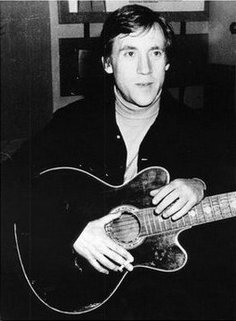 Владимир
Высоцкий родился в Москве, "Дом на Первой Мещанской, в конце" -
согласно его же свидетельству из песни "Баллада о детстве". После
пребывания в эвакуации на Урале, а затем вместе с отцом в послевоенной
Германии, Высоцкий поселяется в Большом Каретном переулке ("Где твои
семнадцать лет? На Большом Каретном..."), где и сложился дружеский
круг, которому Владимир Семенович показывал свои первые песни. Высоцкий
не сразу определил, что хочет быть актером. После окончания школы он
поступает в московский инженерно-строительный институт, но проучившись
в нем полгода, бросает его. Это решение он принял в новогоднюю ночь с
1955 на 1956 год. Они с Игорем Кохановским, школьным другом Высоцкого,
решили встретить Новый год весьма своеобразно: за рисованием чертежей,
без которых их просто не допустили бы к экзаменационной сессии. После
боя курантов, выпив по бокалу шампанского, они принялись за дело.
Где-то к двум часам ночи чертежи были готовы. Но тут Высоцкий встал,
взял со стола баночку с тушью, и стал поливать ее остатками свой
чертеж. "Все. Буду готовиться, есть еще полгода, попробую поступить в
театральный. А это - не мое...", - сказал тогда Владимир Семенович.
Владимир
Высоцкий родился в Москве, "Дом на Первой Мещанской, в конце" -
согласно его же свидетельству из песни "Баллада о детстве". После
пребывания в эвакуации на Урале, а затем вместе с отцом в послевоенной
Германии, Высоцкий поселяется в Большом Каретном переулке ("Где твои
семнадцать лет? На Большом Каретном..."), где и сложился дружеский
круг, которому Владимир Семенович показывал свои первые песни. Высоцкий
не сразу определил, что хочет быть актером. После окончания школы он
поступает в московский инженерно-строительный институт, но проучившись
в нем полгода, бросает его. Это решение он принял в новогоднюю ночь с
1955 на 1956 год. Они с Игорем Кохановским, школьным другом Высоцкого,
решили встретить Новый год весьма своеобразно: за рисованием чертежей,
без которых их просто не допустили бы к экзаменационной сессии. После
боя курантов, выпив по бокалу шампанского, они принялись за дело.
Где-то к двум часам ночи чертежи были готовы. Но тут Высоцкий встал,
взял со стола баночку с тушью, и стал поливать ее остатками свой
чертеж. "Все. Буду готовиться, есть еще полгода, попробую поступить в
театральный. А это - не мое...", - сказал тогда Владимир Семенович.
Среди многочисленных бардов Владимир Высоцкий до сих пор остается немеркнущей звездой. Интерес к авторской песне у Высоцкого пробудился после знакомства с творчеством Булата Окуджавы, которого Владимир Семенович считал своим учителем. Позже он напишет "Песню о Правде и Лжи", посвященную Окуджаве. Свои первые песни Высоцкий начал писать в начале 60-х годов. Это были песни в стиле "дворовой романтики" и не воспринимались всерьез ни Высоцким, ни теми, кто был их первыми слушателями. Спустя несколько лет, в 1965-м, он напишет знаменитую "Подводную лодку", о которой Игорь Кохановский впоследствии скажет: "Подводная лодка - это было уже всерьез.И я думаю, что именно эта песня заявила о том, что пора его творческой юности кончилась."
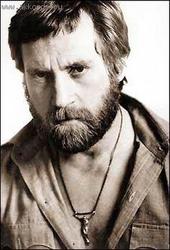 Примерно
в это время Владимир Высоцкий приходит в Театр на Таганке, который по
выражению самого Высоцкого, стал для него "своим театром". "Ко мне в
театр пришел наниматься молодой человек. Когда я спросил его, что он
хочет прочитать, он ответил: "Я несколько своих песен написал,
послушаете?" Я согласился послушать одну песню, то есть, фактически,
наша встреча должна была продлиться не более пяти минут. Но я слушал,
не отрываясь, полтора часа", - вспоминает Юрий Любимов. Так начался
творческий путь Высоцкого в Театре на Таганке. Гамлет, Галилей,
Пугачев, Свидригайлов - целая палитра образов, созданных вместе с Юрием
Любимовым. Любимов поставит и последний спектакль с Высоцким - прощание
Владимира Семеновича со зрителями...
Примерно
в это время Владимир Высоцкий приходит в Театр на Таганке, который по
выражению самого Высоцкого, стал для него "своим театром". "Ко мне в
театр пришел наниматься молодой человек. Когда я спросил его, что он
хочет прочитать, он ответил: "Я несколько своих песен написал,
послушаете?" Я согласился послушать одну песню, то есть, фактически,
наша встреча должна была продлиться не более пяти минут. Но я слушал,
не отрываясь, полтора часа", - вспоминает Юрий Любимов. Так начался
творческий путь Высоцкого в Театре на Таганке. Гамлет, Галилей,
Пугачев, Свидригайлов - целая палитра образов, созданных вместе с Юрием
Любимовым. Любимов поставит и последний спектакль с Высоцким - прощание
Владимира Семеновича со зрителями...
Однако в театре не всегда все шло гладко. Почти отеческое отношение
Юрия Любимова к Высоцкому и всегда прощавшиеся ему проступки, вызывали
зависть коллег-актеров, за исключением нескольких друзей Высоцкого -
Золотухина, Демидовой, Филатова. Параллельно с работой в театре были
киноработы. Самая известная и самая любимая роль - Жеглов в телесериале
"Место встречи изменить нельзя". Тем не менее, этой роли могло и не
быть... Майским вечером 78-го года, на даче в Одессе Высоцкий, Влади и
Говорухин собрались, чтобы обсудить сценарий будущего фильма. И вдруг
Марина Влади со слезами на глазах берет Говорухина за руку и уводит из
комнаты. "Отпусти Володю, снимай другого артиста!". Ей вторил Высоцкий:
"Пойми, мне так мало осталось! Я не могу год жизни тратить на эту
роль." "Как много потеряли бы зрители, если бы я сдался в тот вечер", -
вспоминает Говорухин. И действительно, персонаж получился очень
реалистичным. Многие телезрители были убеждены, что Глеб Жеглов - не
выдуманный персонаж. После показа фильма еще долго шли письма по
адресу: "МВД, капитану Жеглову".
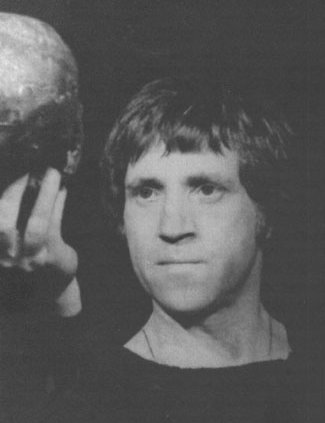 А
потом пришла Любовь. Марина Влади вошла в его жизнь в 1967 году.
Высоцкий влюбился в нее после просмотра кинофильма "Колдунья". Он
смотрел фильм по нескольку раз в день, мечтал о встрече многие годы. И
вот, наконец, она состоялась. Первое знакомство произошло в ресторане
ВТО - Высоцкий пришел туда после спектакля. "Краешком глаза я замечаю,
что к нам направляется невысокий, плохо одетый молодой человек. Я
мельком смотрю на него, и только светло-серые глаза на миг привлекают
мое внимание. Но возгласы в зале заставляют меня прервать рассказ, и я
поворачиваюсь к нему. Он подходит, молча берет мою руку и долго не
выпускает, потом целует ее, садится напротив и уже больше не сводит с
меня глаз. Его молчание не стесняет меня, мы смотрим друг на друга, как
будто всегда были знакомы. Я знаю, что это - ты", - так описывает свое
первое знакомство с Высоцким Марина Влади. Через несколько лет они
поженились. Марина Влади была с ним рядом двенадцать лет. "Я жив,
двенадцать лет тобой храним..." - успеет написать он на обратной
стороне телеграфного бланка. И все эти годы Марина Влади пыталась
замедлить бешеный ритм жизни Высоцкого.
А
потом пришла Любовь. Марина Влади вошла в его жизнь в 1967 году.
Высоцкий влюбился в нее после просмотра кинофильма "Колдунья". Он
смотрел фильм по нескольку раз в день, мечтал о встрече многие годы. И
вот, наконец, она состоялась. Первое знакомство произошло в ресторане
ВТО - Высоцкий пришел туда после спектакля. "Краешком глаза я замечаю,
что к нам направляется невысокий, плохо одетый молодой человек. Я
мельком смотрю на него, и только светло-серые глаза на миг привлекают
мое внимание. Но возгласы в зале заставляют меня прервать рассказ, и я
поворачиваюсь к нему. Он подходит, молча берет мою руку и долго не
выпускает, потом целует ее, садится напротив и уже больше не сводит с
меня глаз. Его молчание не стесняет меня, мы смотрим друг на друга, как
будто всегда были знакомы. Я знаю, что это - ты", - так описывает свое
первое знакомство с Высоцким Марина Влади. Через несколько лет они
поженились. Марина Влади была с ним рядом двенадцать лет. "Я жив,
двенадцать лет тобой храним..." - успеет написать он на обратной
стороне телеграфного бланка. И все эти годы Марина Влади пыталась
замедлить бешеный ритм жизни Высоцкого.
"Работать надо!" - была его любимая поговорка. Если бы он мог, он работал бы круглые сутки. Сон - 3-4 часа, остальное - работа. Песни свои он писал в основном ночью. Приходил домой после спектакля, и садился за работу. Марина ставила перед ним чашку с обжигающим чаем, и тихо садилась в углу. Иногда она засыпала, и тогда, уже под утро, Высоцкий будил ее, чтобы прочесть строки, написанные за ночь. Песни Высоцкого принято делить на циклы: военный, горный, спортивный, китайский... Надо было прожить несколько жизней, чтобы прочувствовать все персонажи, обрисованные в песнях. Фронтовики, слушавшие его песни о войне, были уверены, что он лично пережил все то, о чем писал в песнях. Люди, слушавшие его песни "с криминальным уклоном", были уверены, что он сидел. Моряки, альпинисты, шоферы-дальнорейсовики - все считали его своим. В каждой песне была правда жизни. Сам Высоцкий так говорил об авторской песне: "Я хочу сказать и заверить, что авторская песня требует очень большой работы. Эта песня все время живет с тобой, не дает тебе покоя ни днем, ни ночью."
...25 июля 1980 года. Высоцкого хоронила, казалось, вся Москва, хотя официального сообщения о смерти не было - в это время проходила московская Олимпиада. Только над окошком театральной кассы было вывешено скромное объявление: "Умер актер Владимир Высоцкий." Ни один человек не сдал обратно билет - каждый хранит его у себя как реликвию... "Кому сказать спасибо, что - живой!" - написал Высоцкий в своем известном стихотворении. Высоцкий жив и сегодня, благодаря людской памяти, питавшейся и питающейся по сей день его стихотворениями, драматургическими произведениями, киноролями, песнями...